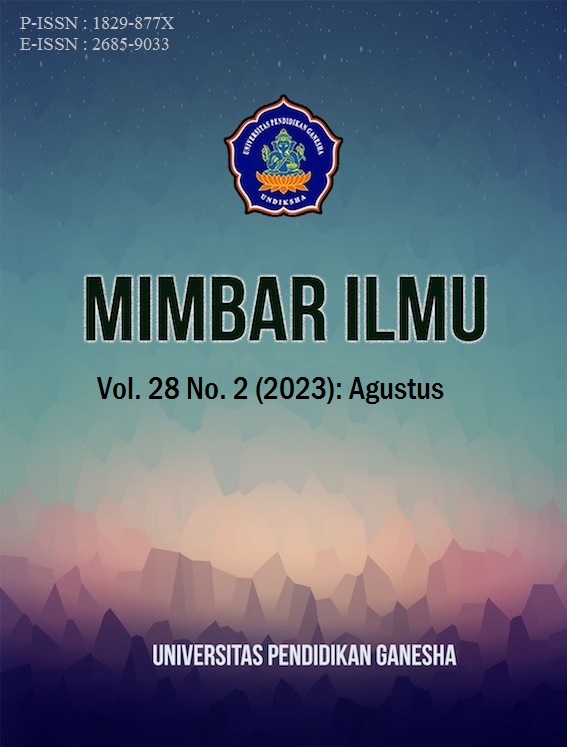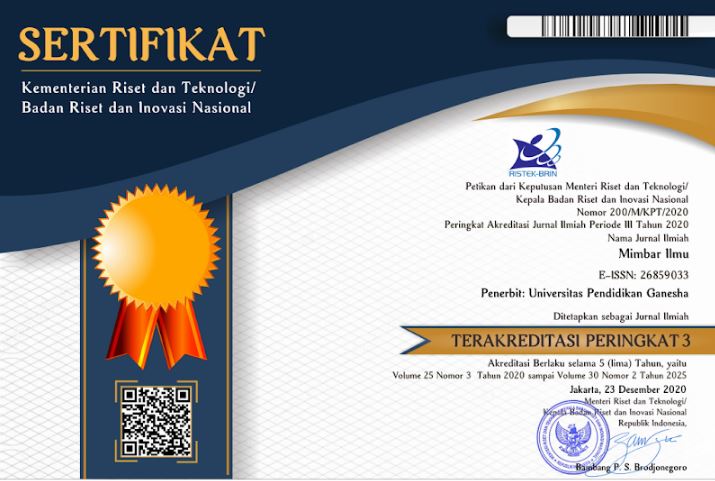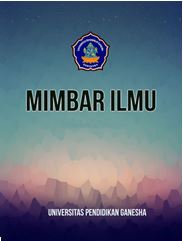Self-Efficacy and Study Habits on Mathematics Knowledge of Fifth Grade Elementary School Students
DOI:
https://doi.org/10.23887/mi.v28i2.60868Kata Kunci:
Mathematical Knowledge, Self-Efficacy, Study HabitsAbstrak
The achievement of the fifth grade students' mathematical knowledge is relatively low. Internal factors and external factors are the causes of low student learning outcomes. This study aims to analyze self-efficacy and study habits on the Mathematics knowledge of fifth grade elementary school students. This study uses an ex post facto research design with a correlational study approach. The population in this study were all 197 students of class V elementary school. The sample in this study was determined using a proportional random sampling technique with a total sample of 132 people. The method in this study uses non-test methods, namely questionnaires and document recording. Analysis of research data using simple linear regression analysis and multiple linear regression analysis. The results of the research analysis show that based on the correlation coefficient test at a significance level of 5% with dk = 130, rtable = 0.171, thus rcount = 0.831 > rtable = 0.171, which means the coefficient value is significant. Furthermore, the coefficient of determination obtained was R2 = 0.691 and its contribution was 69.1% of the variation in Mathematics knowledge scores determined by self-efficacy and study habits. Based on these results, it can be concluded that there is a significant joint influence of self-efficacy and study habits on Mathematics knowledge. 1% of the variation in Mathematics knowledge scores is determined by self-efficacy and study habits. Based on these results, it can be concluded that there is a significant joint influence of self-efficacy and study habits on Mathematics knowledge. 1% of the variation in Mathematics knowledge scores is determined by self-efficacy and study habits. Based on these results, it can be concluded that there is a significant joint influence of self-efficacy and study habits on Mathematics knowledge.
Referensi
Agustiningtyas, P., & Surjanti, J. (2021). Peranan Teman Sebaya dan Kebiasaan Belajar Terhadap Hasil Belajar Melalui Motivasi Belajar Di Masa Covid-19. Edukatif : Jurnal Ilmu Pendidikan, 3(3), 794–805. https://doi.org/10.31004/edukatif.v3i3.454. DOI: https://doi.org/10.31004/edukatif.v3i3.454
Andrie, S., Novi W, R. A., & Saputri, S. D. (2019). Pengaruh Kebiasaan Belajar Terhadap Prestasi Belajar Siswa. Ekuitas: Jurnal Pendidikan Ekonomi, 7(2), 117–121. https://doi.org/10.23887/ekuitas.v7i2.17917. DOI: https://doi.org/10.23887/ekuitas.v7i2.17917
Ariana, K. A., Gading, K., & Tastra, D. K. (2018). Pengaruh Model Think Talk Write Dan Efikasi Diri Terhadap Hasil Belajar Matematika Siswa Kelas V SD. Mimbar PGSD Undiksha, 6(1). https://doi.org/10.23887/jjpgsd.v6i1.13114.
Arsyad, N., Nasrullah, & Ildayanti. (2020). Pengaruh Regulasi Diri, Efikasi Diri, dan Kemampuan Berpikir Kreatif terhadap Hasil Belajar Matematika Siswa. Issues in Mathematics Education (IMED), 4(1), 83. https://doi.org/10.35580/imed15293. DOI: https://doi.org/10.35580/imed15293
Aryani, E. D., Fadjrin, N., Azzahro’, T. A., & Fitriono, R. A. (2022). Implementasi Nilai-Nilai Pancasila Dalam Pendidikan Karakter. Gema Keadilan, 9(3). https://doi.org/10.14710/gk.2022.16430. DOI: https://doi.org/10.14710/gk.2022.16430
Budiana, S., Karmila, N., & Devi, R. (2021). Pengaruh Kebiasaan Belajar Terhadap Hasil Belajar Siswa Matematika. Pedagogia: Jurnal Ilmiah Pendidikan, 12(02), 70–73. https://journal.unpak.ac.id/index.php/pedagogia. DOI: https://doi.org/10.55215/pedagogia.v12i2.2937
Chita, A., & Harahap, P. (2019). Character Building Pendidikan Karakter. Jurnal Pendidikan Dan Konseling, 9(1), 1–11. https://doi.org/10.30829/al-irsyad.v9i1.6732.
Devisafitri, A., & Pramonoadi. (2019). Hubungan Kesiapan Belajar Siswa Dengan Hasil Belajar Siswa Kelas VIII di SMP Negeri 1 Wringinanom. Buana Matematika : Jurnal Ilmiah Matematika Dan Pendidikan Matematika, 9(2:), 73–76. https://doi.org/10.36456/buanamatematika.v9i2:.2119. DOI: https://doi.org/10.36456/buanamatematika.v9i2:.2119
Hardimansyah, H., Ganefri, G., & Amran, A. (2021). Komparasi Pengaruh Efikasi Diri, Kebiasaan Belajar dan Lingkungan Sekolah Terhadap Hasil Belajar Matematika Siswa SMK. Jurnal Pedagogi Dan Pembelajaran, 4(1), 147. https://doi.org/10.23887/jp2.v4i1.33607. DOI: https://doi.org/10.23887/jp2.v4i1.33607
Hartati, I., Suciati, I., & Wahyuni, D. S. (2021). Pengaruh Efikasi Diri Terhadap Hasil Belajar Matematika Meta Analisis. Guru Tua : Jurnal Pendidikan Dan Pembelajaran, 4(2), 49–56. https://doi.org/10.31970/gurutua.v4i2.74. DOI: https://doi.org/10.31970/gurutua.v4i2.74
Herzamzam, D. A. (2021). Peningkatkan Motivasi dan Self Efficacy Belajar Matematika melalui Model Pembelajaran Berbasis Masalah pada Siswa Sekolah Dasar. Jurnal Basicedu, 5(4), 2133–2144. https://doi.org/10.31004/basicedu.v5i4.1177. DOI: https://doi.org/10.31004/basicedu.v5i4.1177
Linggi, G. G. A., Hindiarto, F., & Roswita, M. Y. (2021). Efikasi Diri Akademik, Dukungan Sosial, Dan Resiliensi Akademik Mahasiswa Perantau Pada Pembelajaran Daring Di Masa Pandemi Covid-19. Jurnal Psikologi, 14(2), 217–232. https://doi.org/10.35760/psi.2021.v14i2.5049. DOI: https://doi.org/10.35760/psi.2021.v14i2.5049
Mahmudah, K., Pambudi, D. S., Oktavianingtyas, E., Lestari, N. D. S., & Murtikusuma, R. P. (2021). Hubungan Antara Kebiasaan Belajar Dan Motivasi Belajar Dengan Prestasi Belajar Matematika Siswa Smp Selama Pembelajaran Daring. Kadikma, 12(2), 58. https://doi.org/10.19184/kdma.v12i2.26345. DOI: https://doi.org/10.19184/kdma.v12i2.26345
Nainggolan, D. H., Sidabalok, N. E., & Aritonang, E. (2022). Pengaruh Kebiasaan Belajar Terhadap Hasil Belajar Matematika. Elektriese: Jurnal Sains Dan Teknologi Elektro, 12(01), 1–6. https://doi.org/10.47709/elektriese.v12i01.1552. DOI: https://doi.org/10.47709/elektriese.v12i01.1552
Nugroho, R., & Warmi, A. (2022). Pengaruh Motivasi Belajar Terhadap Hasil Belajar Matematika Siswa Di Smpn 2 Tirtamulya. EduMatSains : Jurnal Pendidikan, Matematika Dan Sains, 6(2), 407–418. https://doi.org/10.33541/edumatsains.v6i2.3627. DOI: https://doi.org/10.33541/edumatsains.v6i2.3627
Nur, M. A. (2022). Pengaruh Efikasi Diri Matematika Terhadap Prestasi Belajar Matematika Siswa di Masa Pandemi Covid-19. Jurnal Pendidikan Matematika Raflesia, 7(3), 66–76. https://doi.org/10.33369/jpmr.v7i3.24041.
Semadi, Y. P. (2019). Filsafat Pancasila Dalam Pendidikan Di Indonesia Menuju Bangsa Berkarakter. Jurnal Filsafat Indonesia, 2(2), 82. https://doi.org/10.23887/jfi.v2i2.21286. DOI: https://doi.org/10.23887/jfi.v2i2.21286
Septikasari, R., & Nugraha, R. (2020). Keterampilan 4C Abad 21 Dalam Pembelajaran Pendidikan Dasar. Journal of the American College of Cardiology, 75(20), 2635–2638. https://doi.org/10.1016/j.jacc.2020.04.015. DOI: https://doi.org/10.1016/j.jacc.2020.04.015
Sripatmi, S., Baidowi, B., & Fitriani, F. (2019). Pengaruh Motivasi dan Kebiasaan Belajar Terhadap Hasil Belajar Matematika Siswa Kelas XI SMAN 1 Jonggat. Mandalika Mathematics and Educations Journal, 1(2), 104–112. https://doi.org/10.29303/jm.v1i2.1428. DOI: https://doi.org/10.29303/jm.v1i2.1428
Taufik, T., & Komar, N. (2022). Hubungan Self Efficacy Terhadap Peningkatan Motivasi Belajar Dan Hasil Belajar Matematika Siswa Di Sekolah. Andragogi: Jurnal Pendidikan Islam Dan Manajemen Pendidikan Islam, 3(2), 183–200. https://doi.org/10.36671/andragogi.v3i2.220. DOI: https://doi.org/10.36671/andragogi.v3i2.220
Tuaputimain, H. (2021). Korelasi Antara Efikasi Diri dengan Prokrastinasi Akademik di Kalangan Mahasiswa. Jurnal Teologi Berita Hidup, 4(1), 180–191. https://doi.org/10.38189/jtbh.v4i1.187 DOI: https://doi.org/10.38189/jtbh.v4i1.187
Widiati, Sridana, N., Kurniati, N., & Amrullah, A. (2022). Pengaruh Minat Belajar dan Kebiasaan Belajar terhadap Prestasi Belajar Matematika. Griya Journal of Mathematics Education and Application, 2(4), 885–892. https://doi.org/10.29303/griya.v2i4.240. DOI: https://doi.org/10.29303/griya.v2i4.240
Wulandari, I. G. A. A., & Agustika, G. N. S. (2018). Pengaruh Gaya Kognitif Terhadap Hasil Belajar Matematika Pada Mahasiswa Semester IV Jurusan PGSD UPP Denpasar Universitas Pendidikan Ganesha Tahun Ajaran 2016/2017. Jurnal Ilmiah Sekolah Dasar, 2(1), 94. https://doi.org/10.23887/jisd.v2i1.15515. DOI: https://doi.org/10.23887/jisd.v2i1.15515
Yasa, I. K., Pudjawan, D., & Agustiana, I. G. A. T. (2020). Peningkatan Efikasi Diri Siswa Pada Mata Pelajaran IPA Kelas IV SD Melalui Model Pembelajaran Numbered Head Together. Mimbar PGSD Undiksha, 8(3). https://doi.org/10.23887/jjpgsd.v8i3.25351.
Zagoto, S. F. L. (2019). Efikasi Diri Dalam Proses Pembelajaran. Jurnal Review Pendidikan Dan Pengajaran, 2(2), 386–391. https://doi.org/10.31004/jrpp.v2i2.667. DOI: https://doi.org/10.31004/jrpp.v2i2.667
Unduhan
Diterbitkan
Cara Mengutip
Terbitan
Bagian
Lisensi
Hak Cipta (c) 2023 Ni Kadek Ayu Dwi Widia Rini, Gusti Ngurah Sastra Agustika

Artikel ini berlisensiCreative Commons Attribution-ShareAlike 4.0 International License.
This work is licensed under a Creative Commons Attribution-ShareAlike 4.0 International License.
Authors who publish with this journal agree to the following terms:
- Authors retain copyright and grant the journal right of first publication with the work simultaneously licensed under a Creative Commons Attribution License that allows others to share the work with an acknowledgment of the work's authorship and initial publication in this journal.
- Authors are able to enter into separate, additional contractual arrangements for the non-exclusive distribution of the journal's published version of the work (e.g., post it to an institutional repository or publish it in a book), with an acknowledgment of its initial publication in this journal.
- Authors are permitted and encouraged to post their work online (e.g., in institutional repositories or on their website) prior to and during the submission process, as it can lead to productive exchanges, as well as earlier and greater citation of published work.









